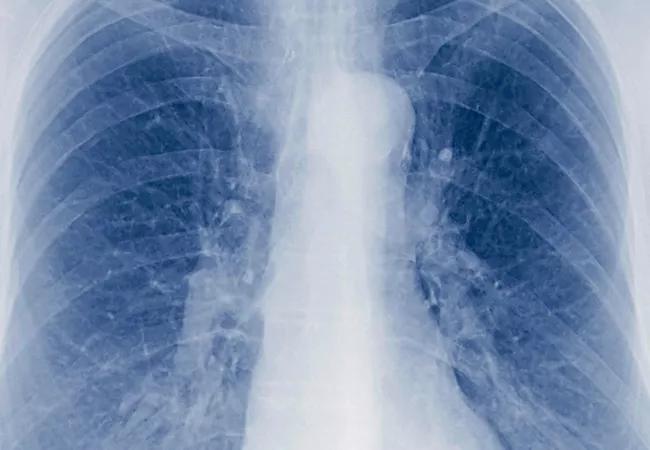Recurrence and outcomes for stage II disease are worse than in ever-smokers

Image content: This image is available to view online.
View image online (https://assets.clevelandclinic.org/transform/d256a4d7-586d-4ac3-b8c5-ef9cdc327937/21-HVI-2228884_non-small-cell-lung-cancer_650x450_jpg)
21-HVI-2228884_non-small-cell-lung-cancer_650x450
Non-small cell lung cancer (NSCLC) — traditionally regarded as a disease of smokers — displays some key differences in patients who have never smoked, according to newly published data. Specifically, although never-smokers have better survival in stage I NSCLC than ever-smokers, they have more rapid disease recurrence and higher mortality in more advanced stages. Additionally, never-smoker NSCLC patients are more likely than their ever-smoker counterparts to be women, have disease in the lower lobe and have adenocarcinoma as the histopathologic subtype.
Advertisement
Cleveland Clinic is a non-profit academic medical center. Advertising on our site helps support our mission. We do not endorse non-Cleveland Clinic products or services. Policy
These findings, gleaned from an analysis of patients treated surgically for NSCLC at Cleveland Clinic, were recently reported in the Journal of Thoracic and Cardiovascular Surgery (2021;161:1903-1917).
“The differences we discerned were pronounced enough that we must consider whether NSCLC is, at least in part, a distinct clinical entity in never-smokers,” says the study’s senior and corresponding author Sudish Murthy, MD, PhD, Section Head of Thoracic Surgery at Cleveland Clinic. “If that is the case, it has potential ramifications for screening, diagnosis and treatment.”
NSCLC is increasingly seen in people who have never smoked. Evidence from other researchers indicates that gene mutations and molecular profiles in lung cancer differ between never-smokers and ever-smokers, supporting the hypothesis that the disease is different at an underlying level between the two groups.
The Cleveland Clinic study was designed to identify differences between never-smokers and ever-smokers in demographics and cancer characteristics. Once differences were identified, cohorts were balanced to compare survival and cancer recurrence rates.
Patients who underwent pulmonary resection for NSCLC at Cleveland Clinic between January 2006 and July 2016 were included in the study. In total, 172 (11%) were never-smokers and 1,376 (89%) were ever-smokers. The two cohorts were matched by patient characteristics, histopathological cancer cell type and pathological stage. A weighted balancing score was used to compare survival and cancer recurrence, and machine learning was used to identify differences related to individual characteristics.
Advertisement
Compared with their ever-smoker counterparts, never-smokers with NSCLC were:
Notably, among matched pairs, never-smokers had greater survival at five years in pathological stage I compared with ever-smokers (96% vs. 78%) but lower survival at five years in stage II (54% vs. 78%). Additionally, freedom from cancer recurrence at five years was lower among never-smokers (68% vs. 79%), with recurrence among those with stage II NSCLC driving the difference.
Several factors — tumor size, lymph node burden and histopathological cell type — were found to be more predictive of cancer recurrence and death among never-smokers compared with ever-smokers.
“The differences we found in NSCLC in never-smokers, particularly in terms of outcomes for stage II disease, suggest unique tumor or host behaviors may be at play,” says Usman Ahmad, MD, a Cleveland Clinic thoracic surgeon and study co-author.
He and his co-authors write that their findings highlight the need for further research in this realm and may argue for taking new actions in public health and clinical arenas, as summarized below.
Consider instituting public health measures to screen for NSCLC regardless of smoking history.Never-smokers now constitute up to 15% of newly diagnosed lung cancer patients, yet they are not offered screening to detect occult NSCLC, which is routine for smokers. Similarly, although the prevalence of NSCLC in never-smoker women is comparable to that of cervical cancer, the screening efforts that are widespread for cervical cancer are wholly lacking for NSCLC.
Advertisement
“The finding that late-stage NSCLC behaves more aggressively in never-smokers highlights the importance of early detection,” Dr. Ahmad emphasizes.
Conduct more genetic and molecular research on NSCLC in never-smokers. Other research indicates that certain gene rearrangements, more common in never-smokers, are associated with reduced efficacy of platinum-based chemotherapy and immune checkpoint inhibitors. Although Cleveland Clinic tested for mutations only after cancer recurrence during the 2006-2016 study period, it now tests all tumors for known activating mutations, which promises to accelerate initiation of optimally informed therapy.
Differentiate between never- and ever-smokers in clinical research. Some studies have already found that drug efficacy varies by proportions of never-smokers enrolled.
Consider incorporating smoking history into NSCLC staging and treatment algorithms. As more understanding is gained, smoking history may become an important factor in management, with more-aggressive treatment indicated for advanced disease in never-smokers.
“As precision medicine advances, new algorithms can be expected to more accurately guide prognosis and optimize treatment strategies,” Dr. Murthy concludes. “I expect that smoking history will one day be a standard factor in such tools.”
Advertisement
Advertisement
Combination therapy improves outcomes, but lobular patients still do worse overall than ductal counterparts
Bringing empathy and evidence-based practice to addiction medicine
Supplemental screening for dense breasts
Combining advanced imaging with targeted therapy in prostate cancer and neuroendocrine tumors
Early results show strong clinical benefit rates
The shifting role of cell therapy and steroids in the relapsed/refractory setting
Radiation therapy helped shrink hand nodules and improve functionality
Standard of care is linked to better outcomes, but disease recurrence and other risk factors often drive alternative approaches